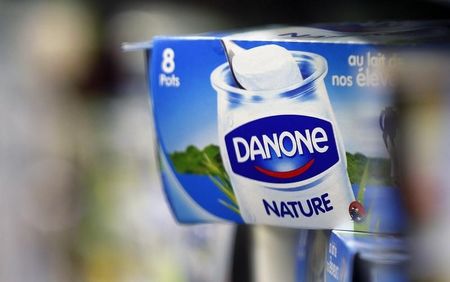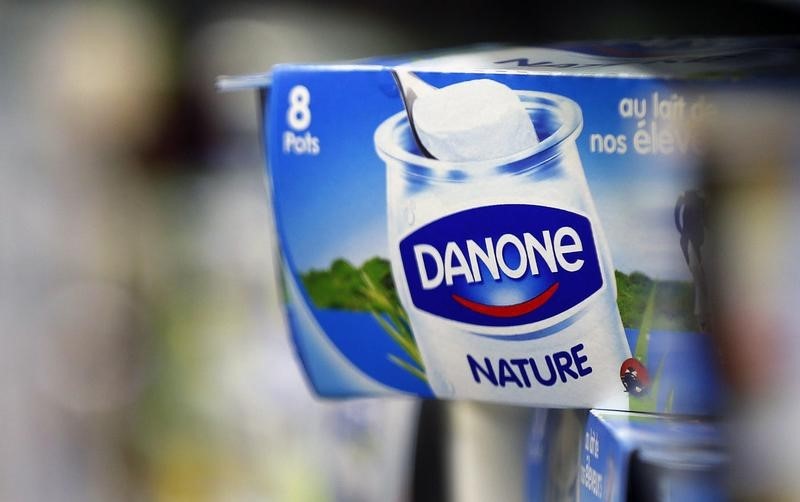By Sophie Sassard
PARIS (Reuters) - French food giant Danone (PA:DANO), maker of Activia yoghurt and Evian water, has decided it wants to pursue a takeover of U.S. infant formula maker Mead Johnson Nutrition Group (N:MJN), sources familiar with the matter told Reuters.
"Danone has done its internal strategic review and decided that Mead Johnson is its preferred acquisition," one of the sources said, speaking on condition of anonymity because the matter is private.
Paris-based Danone has been grappling with falling earnings, and investors have begun to question whether the company can thrive in its current form as it competes with much-larger rivals Nestle (VX:NESN) and Unilever (L:ULVR).
The company is also trying to reduce its dependence on slow-growth Europe, recently doing deals in emerging markets like China and Africa.
With regard to Mead Johnson, the sources did not say whether Danone had made any approach to Mead Johnson or hired any advisors. Danone and Mead Johnson declined to comment.
Shares in the U.S. firm were up 9.5 percent at $99.91 in afternoon trade in New York.
JPMorgan analysts estimated that Mead Johnson would not sell for less than 20 times operating earnings, or $120 per share, based on the multiple of 20 times that Nestle paid for Pfizer's (N:PFE) infant formula business in 2012 and the 22 times that Danone paid for Numico's baby food business in 2007.
Those multiples suggest a deal value of $24 billion to $26 billion, based on the number of Mead Johnson shares outstanding as of July 17.
Any deal for Mead Johnson, which was spun off from drugmaker Bristol-Myers Squibb (N:BMY) in 2009, would use cash and shares and would not be driven by tax issues, said a second source.
Analysts have long said that Mead Johnson, the maker of Enfamil baby formula, would be a logical but ambitious move for Danone, helping it grow in Latin America and Asia.
Many have speculated that Danone might sell an asset before buying one, repeating the pattern from 2007, when it bid 12.3 billion euros for Numico less than a week after announcing the 5.3 billion euro sale of its biscuit business to Kraft.
Reuters first reported in February that Danone was looking to sell its medical nutrition business, worth between 4 billion euros and 7 billion euros ($5-9 billion) depending on how much they sell, according to analysts.
"The deal is very complex and is unlikely to close before March next year and is conditional on Danone making a move for Mead Johnson," one of them said.
"Danone needs to sell something before (bidding for Mead Johnson) and medical nutrition will likely to take some time," said a third source familiar with the matter.
Danone has always declined to comment on speculation it was planning to sell its medical nutrition business. CFO Pierre Andre Terisse again declined to discuss the issue on a call with analysts on Oct. 15.
RESHUFFLING
On Sept 2, Danone said its chairman and chief executive, Franck Riboud, would split his role after 18 years running the company.
Riboud, 58, who took over from his late father, Antoine Riboud, in 1996, remains chairman to focus on the company's long-term strategy while Emmanuel Faber, 50, the chief operating officer, became CEO on Oct. 1.
Analysts speculated that the move was partly a sign that top management felt a threat to Danone's independence.
In 2005 the French government deemed dairy a "protected" industry amid rumours that PepsiCo (N:PEP) was preparing to make a bid for Danone.
More recently, Danone's lacklustre performance has attracted criticism, notably from U.S. activist investor Nelson Peltz, who suggested in 2012 that Danone could benefit from a leaner cost structure.
The company makes 55 percent of revenue from dairy products, a sector hit by a spike in milk prices and weak consumer spending in austerity-hit Europe. Its water business makes up 18.5 percent, while its baby food business, which had been hit by a safety scare in China, makes up 20 percent.
Medical nutrition, which sells specialised products to feed the sick, makes up around 6.5 percent of sales.
The global retail market for formula, including that for infants and toddlers, is estimated at $44.8 billion this year, according to Euromonitor International, which expects it to top $84 billion in five years. More than half of the sector's sales are in Asia, growing more than 16 percent a year.
Nestle is the global leader for formula with a 22 percent share, Mead Johnson is second with 13.6 percent and Danone is third with 11.8 percent, according to Euromonitor.

($1 = 0.7833 euro)
(Writing by Anjuli Davies and Martinne Geller in London; Editing by Greg Mahlich and David Evans)
